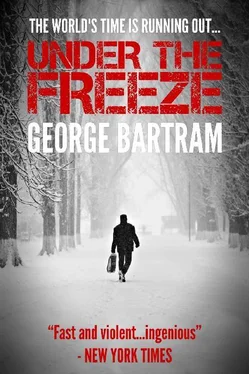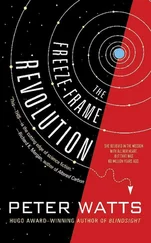There was, to be sure, a figure with a name: Nazdia Becker. There was a marriage date: 1949. There were some details: Jewish, born in Hungary, refugee; brilliant biochemist, holder of several patents that Schneider Agri-Chem had turned to great profit. But where had she been educated — and when? How, Tarp wondered, had she gotten to Argentina? What was her birth date? She had died in 1971 — but of what?
At three o’clock Tarp turned the machines off and lay down on the cot that had been provided for him. If he dreamed, he remembered nothing. At midmorning he flew to the farm, landed at the security guards’ house two hundred yards away, and walked across a muddy field. The Fiat was in the lane; the Humber was parked under a twisted apple tree, and there was a new Citroen close to the house.
“Too many cars,” he said to the guards. “They attract attention.”
“One of them’s yours.”
“Whose is the Citroen?”
“Nurse. They’re sending the Cuban woman up today.”
He started toward the house. The bearded man grinned. “The old man’s drunk. Watch out for him. He’s bad.” Therese came to the kitchen doorway. “I have made bread,” she said without prelude as he crossed the big room toward the stair.
“Is there cheese?”
“He bought cheese in the village. It is from Denmark. In a can. He thinks it is comical.” She stared at him. “He is drunk.”
“He’ll regret it.”
Repin was upstairs, surrounded by newspapers that the guards had bought for him. On the window ledge were the last crumbs of the brioches. “I have been watching birds,” he said. He was wearing glasses with gold rims that made him look severe. “This is a very boring place. The birds are the most interesting thing here.” He jerked his head. “Except maybe that one.” Tarp looked out and saw the old man asleep on a mound of rotted hay. “When are you going to Moscow?”
“Soon. I need more information. From London.”
“Why do you need information from London so you can go to Moscow?”
“I think they’re two ends of the same stick. I’d like to understand at least one end.”
“You still think it smells?”
“Rotten.”
“You think I have lied to you?”
“It occurred to me, Repin, but I can’t think of why you should. No, it doesn’t smell because it’s wrong; it smells because I don’t understand it. You brought it to me as a simple matter of a man in Dzerzhinsky Square. But it’s not a man in Dzerzhinsky Square. It’s Buenos Aires and maybe London. And Dzerzhinsky Square.”
Repin eyed him over the tops of the glasses. “Moscow cares only about Dzerzhinsky Square.”
“Fuck Moscow.”
“Mm.” Repin went back to the paper. “Better men than you have tried.”
Tarp went down and filled a bucket at the kitchen tap and dumped it over the old man. He groaned and rolled down the pile of moldy hay and lay with one shoulder and an arm in an ice-rimmed puddle. His eyes were, open, however. Tarp bent over him. “This is the warning. I only give one warning. Stay sober or you’re out.” When he went back into the kitchen, Therese was there. “Does he hit you?” he asked.
“Sometimes.”
Tarp put the bucket under the window where he had found it. “Tell him I will hit him once for each time he hits you. I can hit harder than he can. If he gives you trouble, tell me.”
“And if you aren’t here?”
“Tell the other man.”
“The Russian?”
“Yes, the Russian.”
“Is he a nice man?”
“Better than the one you’ve got.”
She nodded. “He liked my bread. He said he would teach me to make brioche.”
Tarp nodded. Repin planned to do more than watch birds, he thought.
He put in a call from the other house to Jenny Barnwell, whose return call came two hours later. He had found somebody, he told Tarp — a petty officer who had been on the navigation bridge during the Homburg engagement. The man lived in a village sixty miles south of London in the Weald.
“I’m on my way.”
He drove the Humber to the ferry at Calais and arrived at Dover late that night. There was a guest house open near the castle. He was on the road again at dawn and in London for a late breakfast. He picked up the dark suit from Hire Attire and got a chauffeur’s cap and what he hoped was Barnwell’s size in a dark coat. Mr. McCann was severe with him. He thought that Tarp was very hard on his clothes.
Jenny was waiting under the Rose. Tarp paid him and then asked him about the man in the Weald.
“Harry Gossens. He retired from the navy in seventy-five, been puttering around his roses or some such stuff ever since.”
“You’re sure he’s alive?”
“He was yesterday. I telephoned him to ask if he wanted to buy an encyclopedia.”
“That was bright.”
“I used to sell encyclopedias, don’t be so quick to criticize!”
“I never thought of you as a man of letters. What’d he sound like?”
“Like a nice old duffer, know what I mean? Lonely, I’d say. Was glad to talk to me, even about the encyclopedias. Almost bought one, the poor sod; I had to persuade him not to. Wife died four years ago of the big C; he’s up with bad circulation of the extremities and don’t get about much, he says. Practically bedridden.”
“You’re sure he’s the right one.”
“Well, I couldn’t come right out and ask him if he was the Harry Gossens that was on the Loyal , now could I? That would rather have queered whatever lie you’re going to tell him, wouldn’t it? But he’s the Harry Gossens that’s getting the pension check for Harry Gossens, Royal Navy retired, number aught seven seven five eleven fifty-one.”
“Jenny, I underestimated you. You have resources.”
“Christ, a compliment! It must be about to rain solid gold suppositories. A compliment from the original hard case! Oh, Mum, can I write it down in my commonplace book?”
Tarp handed him the coat and the hat. “Be a chauffeur.” Barnwell looked at the clothes with disgust. “I should of known. First the pat on the head, then the shove into the pismire. A bloody servant!”
Tarp sat in back while Barnwell, now in the rather ill-fitting chauffeur’s costume, drove him down to Mrs. Bentham’s in Croyden. She peered out through impeccable curtains to see what chauffeured eminence had driven up; recognizing Tarp as her Mr. Rider, she was so grand that he had trouble making sense out of her. She had one thing for him: a list of the German civilians on the Homburg .
“Still classified, Mr. Rider! And publication of these names would involve us both in a technical violation of the act. You are warned.”
“And the names?”
“Three scientists, a banker, an engineer, and four others who were either diplomats or military men incognito . Some of them were easy to identify, but some I simply haven’t had time to track down. Shall I persist?”
“Please do.”
“I didn’t really find a great deal , I’m afraid. These were highly secretive people, you know. One librarian suggested that I might do better on the other side of the Iron Curtain. They seem to have been active there during the Nazis’ heydays.”
“Perhaps I’d better go there to look, then. Thank you so much.”
They drove south and then east, through the far suburbs of London, past one of the reservoirs where boats were being painted, as if spring were really almost there, and into the rising country above the Downs. The narrow road plunged downhill and then up again, always twisting, and there were deep woods and gullies that looked as dark and secretive as they must have when the Romans had found Britons smelting iron here. Harry Gossens’s village was a wriggling cross of two roads lined on each side with brick houses with a pub at the end of each arm as if to mark the limit. It occupied only the top of a hill; on all four sides the roads plunged down into more of the Weald’s wooded gloom.
Читать дальше












